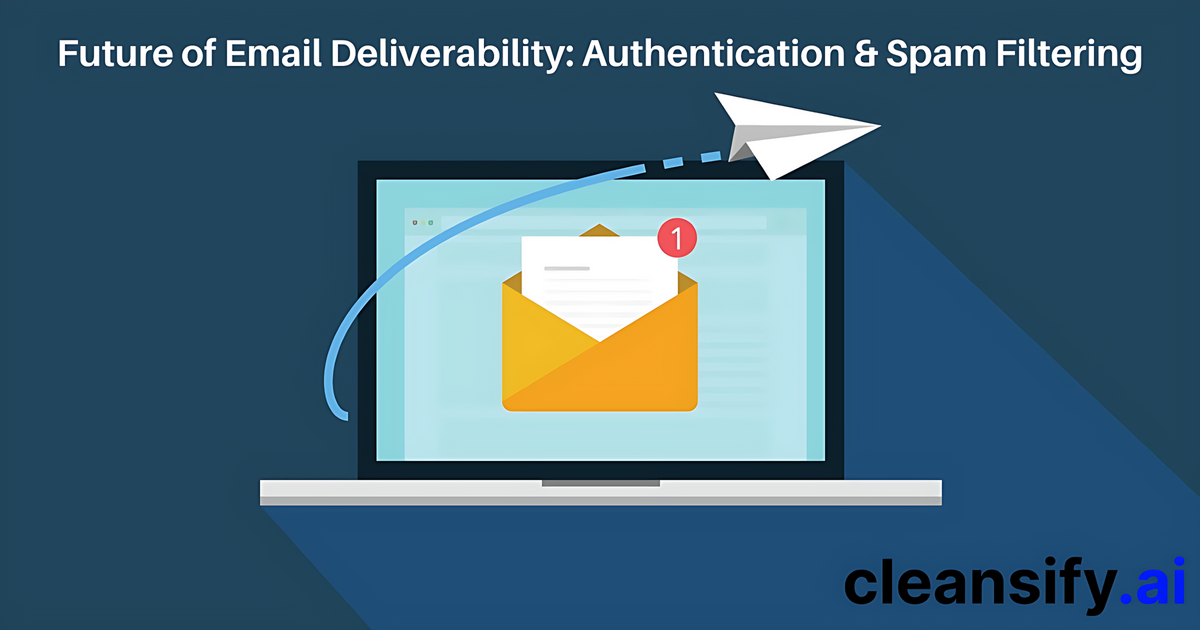The Future of Email Deliverability: Advanced Authentication and Spam Filtering

Email is a vital communication channel for businesses and individuals alike, and email deliverability is a critical component of any email marketing strategy. As spam and phishing attacks become more sophisticated, it's becoming increasingly challenging to ensure that your emails are delivered to your recipients' inboxes. The key to email deliverability success is advanced authentication and spam filtering techniques.
In this blog post, we'll explore the future of email deliverability and the emerging technologies that will help businesses improve their email delivery rates.
What is the importance of Email Deliverability?
Email deliverability refers to the ability of an email to reach its intended recipient's inbox without getting filtered or blocked by internet service providers (ISPs) or email providers.
Email deliverability is important for several reasons, including:
- Building and maintaining a positive reputation: When your emails consistently reach the inbox, it sends a positive signal to ISPs and email providers that your emails are legitimate and wanted, helping you to build and maintain a positive reputation.
- Driving engagement and revenue: Emails that land in the inbox is more likely to be opened and clicked, which can drive engagement and revenue for your business.
- Avoid penalties and legal issues: If your emails are flagged as spam or if you violate anti-spam laws, you may face penalties, legal issues, or damage to your brand reputation.
- Improving customer experience: When your emails are delivered to the inbox, your customers are more likely to see and engage with your content, helping to improve their overall experience with your brand.
How Authentication can help with Spam Filtering?
Email authentication can help with spam filtering in several ways. Firstly, authentication allows email receivers to verify that the email they received was indeed sent by the sender who claims to have sent it. This helps to prevent email spoofing, a tactic used by spammers to trick recipients into opening an email by pretending to be someone else. By verifying the sender's identity, email receivers can filter out emails that fail authentication checks, reducing the amount of spam that lands in the recipient's inbox.
Secondly, authentication allows senders to establish a positive reputation with email receivers. Email receivers can use authentication data to build a reputation score for each sender, which helps them to determine whether to deliver the email to the inbox, mark it as spam, or block it altogether. Senders who consistently authenticate their emails will typically have a higher reputation score and be more likely to have their emails delivered to their inboxes.
Thirdly, authentication can help to improve email engagement metrics, such as open and click-through rates. By reducing the amount of spam that lands in the recipient's inbox, authentication can help to ensure that the recipient is only receiving relevant and valuable emails. This, in turn, can lead to higher engagement rates, as recipients are more likely to open and click on emails from senders they trust.
How spam filtering can impact authentication?
Spam filtering can impact email authentication in a few different ways. Email authentication is the process of verifying that an email is actually from the sender it claims to be from. Authentication helps to prevent email spoofing and phishing attacks, and it is essential for maintaining the security and trustworthiness of email communication.
One way that spam filtering can impact authentication is by using authentication protocols as part of the filtering process. For example, many spam filters check the Sender Policy Framework (SPF) and DomainKeys Identified Mail (DKIM) records of incoming emails to determine whether they are legitimate. If an email fails authentication checks, it may be more likely to be filtered as spam.
On the other hand, if an email passes authentication checks, it is more likely to be delivered to the recipient's inbox, rather than being filtered as spam. This means that good authentication practices can help to improve email deliverability.
However, it's important to note that some spam filters may use over-aggressive filtering techniques that rely heavily on authentication, to the point where legitimate emails may be filtered out. This can be especially problematic for emails from smaller or newer domains that may not have a strong reputation or a well-established authentication record.
The impact of emerging technologies on email deliverability
Emerging technologies such as artificial intelligence (AI) and machine learning (ML) are transforming the way businesses approach email deliverability. These technologies are being used to create more sophisticated filtering techniques that can better identify spam and phishing emails. Using algorithms that learn from previous data, AI and ML can identify patterns and signals that suggest an email is a spam, allowing email receivers to filter out more unwanted emails and deliver only relevant and valuable messages to the inbox.
In addition to filtering, emerging technologies are also being used to improve email authentication. For example, blockchain technology is being used to create a decentralized, tamper-proof record of email authentication data that can be used to verify the identity of email senders. This helps to prevent email spoofing and increases the trustworthiness of email messages.
Overall, emerging technologies are helping businesses to stay ahead of the ever-evolving email landscape, protecting their brand reputation, and establishing trust with their customers. As these technologies continue to develop, we can expect to see further improvements in email deliverability, allowing businesses to more effectively connect with their customers through email.
Conclusion
Email authentication and spam filtering are crucial components of email deliverability, and with emerging technologies like AI and machine learning, businesses have more tools than ever to ensure their emails are being delivered to their intended recipients. As the email landscape continues to evolve, it's essential to stay up-to-date with advances in email authentication and spam filtering techniques to maintain high delivery rates.
By adopting advanced authentication and spam filtering techniques, businesses can establish trust with their customers, protect their brand reputation, and achieve email marketing success. Also, You can verify your email free on Cleansify.ai